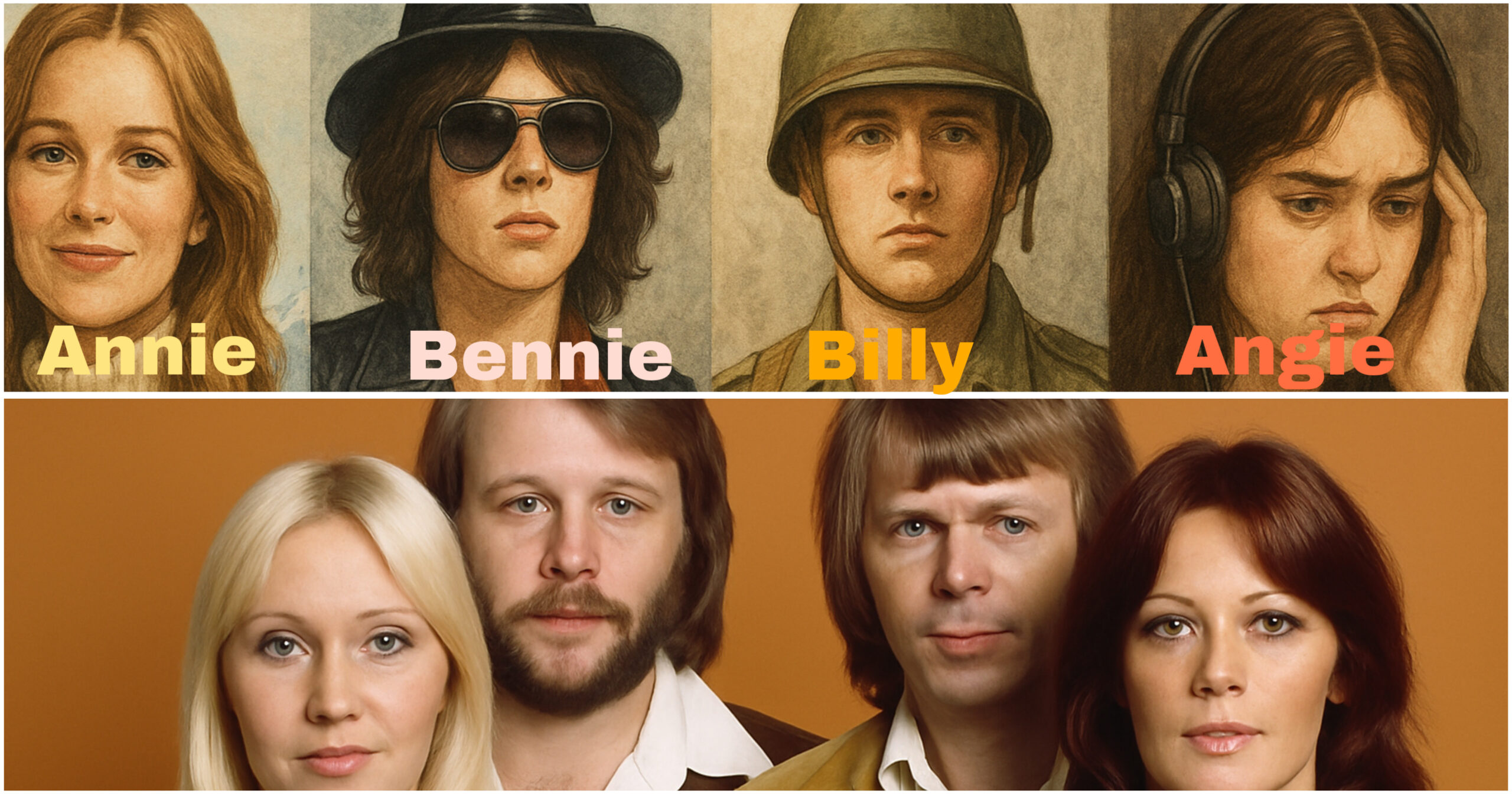When 1974’s Four Number One Songs With Titular First Names Spelled A-B-B-A Just as ABBA First Hit the U.S. Charts
(June 3, 2025). It’s well known that in 1974, the Swedish superstar quartet ABBA — so named for its members Agnetha Fältzkog, Benny Andersson, Björn Ulvaeus, and Anni-Frid Lyngstad — won the annual Eurovision contest and later debuted on the American charts with the song “Waterloo.”
But what music and Billboard chart fans likely don’t recall about 1974 is that there were exactly four unrelated No. 1 songs on the Hot 100 that year that included other first names in their titles. And in the most uncanny of coincidences, those four names also spelled A-B-B-A. It’s the kind of trivia that would make even the most unflappable trivia geeks shout “Mamma Mia!” It’s also the kind that that no one asked about but this blogger will break down anyway because, well, why not?
The names were not Agnetha, Benny, Björn, or Anni-Frid but Annie, Bennie, Billy and Angie. Here’s their story.
First up was “Bennie.”
Bennie of “Bennie & the Jets.” It was a single from Elton John’s iconic Goodbye Yellow Brick Road album and told the story of a fictitious bandleader of whom the song’s narrator was a huge fan. Fans may note that “Bennie” is the homophonic spelling of ABBA’s “Benny” but in some territories outside of North America, Elton’s song was alternately spelled “Benny and the Jets.” Except, in this case, John’s “Bennie” was envisioned as a female with androgynous features, according to an interview co-writer Bernie Taupin gave to Rolling Stone in 2014. The song topped the Billboard Hot 100 in April 1974, just one week before our next “B” entered the chart.
The next “B” was for “Billy.”
“Billy, Don’t Be A Hero” was the No. 1 song by an American group named for another B — Bo Donaldson & the Heywoods — about a make-believe war hero whose girlfriend implores him not to be “a fool with your life” by joining the army and fighting in a war that, to this day, has never been named. “Billy,” the character, dies in the end of the song, but the name lived on in two other No. 1 hits by real Billys that year — in songs sung by Billy Preston (“Nothing From Nothing”) and Billy Swan (“I Can Help”). Another famous Billy also launched his legendary chart career that year: Billy Joel, whose “Piano Man” became his first top 40 hit that April.
And then came the A’s. First was “Annie.”
John Denver’s “Annie’s Song” was inspired by his then-wife Annie Martell Denver. The singer/songwriter wrote it in ten minutes after having just skied down the Aspen Mountain in Colorado and being exhilarated by all the colors and sounds that “filled up his senses,” which reminded him of his Annie. “Annie’s Song” debuted on the Hot 100 during the same week that ABBA’s “Waterloo” did but most similarities ended there. Denver’s tender ballad sped to No. 1 and was already on its way down the chart by the time “Waterloo” entered the top ten during a more modest climb. Both songs coincidentally exited the Hot 100 simultaneously, each totaling 17 weeks on the chart.
Which leaves “Angie.”
The last of 1974’s four No. 1 songs with first names in their titles was Helen Reddy’s ode to a mentally disturbed young girl named Angie who constantly listens to the radio in her room while imaginary lovers come and go. The intentionally ambiguous song takes a Steven King-like twist when a real boy — or so we think — enters Angie’s room with intent to harm her, becomes disoriented by the loud music he hears, and then disappears as Angie turns the volume down… “never to be found.” “Angie Baby” squeezed in a week at No. 1 on the Hot 100 chart dated December 28, 1974, just in time to complete this U.S. chart-topping A-B-B-A coalition and after Sweden’s ABBA had secured their second U.S. top 40 hit — the followup to “Waterloo” — titled “Honey Honey.”
While 1977’s “Dancing Queen” ultimately cemented the real ABBA’s place in American No. 1 pop chart history, the cosmic coincidence of 1974’s first-name chart-toppers spelling out their band name feels like a pop culture prophecy. Whether it was fate, foreshadowing, or just a fluke of alphabetical luck, it’s another reason that 1974 stands out in chart trivia lore. Just as ABBA began gracing dance floors and American airwaves, the charts were quietly spelling another ABBA’s name: Annie, Bennie, Billy and Angie.
DJRob
DJRob (he/him) is a freelance music blogger from the East Coast who covers R&B, hip-hop, disco, pop, rock and country genres – plus lots of music news and current stuff! You can follow him on Bluesky at @djrobblog.bsky.social, X (formerly Twitter) at @djrobblog, on Facebook or on Meta’s Threads.
You can also register for free (select the menu bars above) to receive notifications of future articles.


